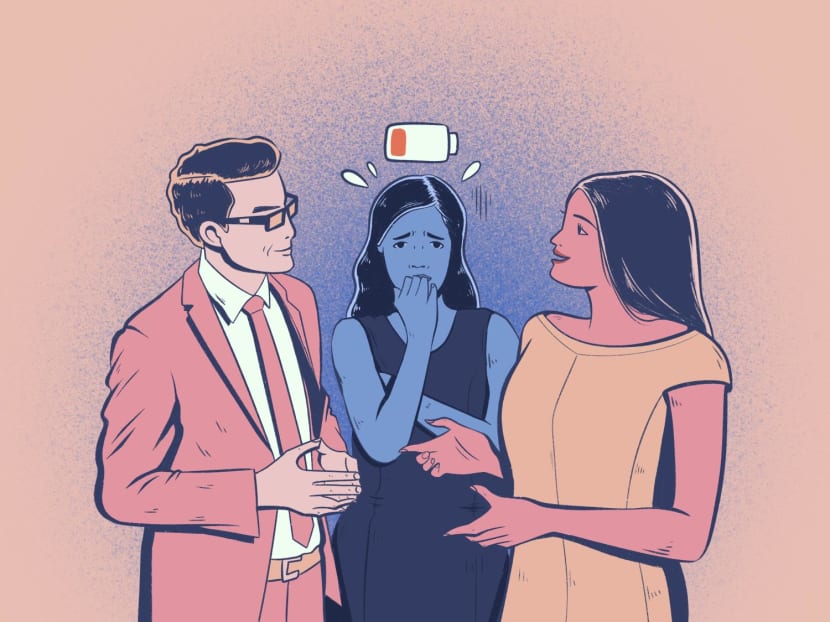Commentary: As an introvert, I found networking uncomfortable. Here are 5 tips that helped me overcome my fear

For the first 15 years of her professional life, the author avoided networking like the plague.
Have you turned down invitations to networking events? Or attended a conference only to leave immediately after the scheduled speakers wrap up on stage, so that you can avoid the post-programme mingling?
I have.
Being an introvert, networking made me cringe and my stomach churn. It made me want to turn and flee — and I often did.
For the first 15 years of my professional life, I avoided networking like the plague.
On the few occasions I absolutely had to attend a conference or an industry event, I mostly stood around awkwardly, watching some people breeze into the crowded room and effortlessly strike up a conversation with others like long-lost friends.
I could never bring myself to approach a stranger — or worse, a group of strangers — and engage in small talk. It felt unnatural and “fake”.
Over time, I convinced myself that networking just wasn't my cup of tea.
A CHANGE IN PERSPECTIVE
Two years ago, I embarked on a big career transition from procurement to user experience (UX) design. To improve at a faster rate, I wanted to meet more UX designers to learn about their experience and to seek feedback on my portfolio.
For once, I felt the push to reach out to others in the industry. I knew I had to do something to overcome my discomfort with networking.
So, for the first time in my life, I attended a networking event entirely out of my own volition.
And I did it alone.
My heart was pounding fearfully as I stood by myself and scanned the crowd for a friendly face.
I eventually mustered the courage to approach someone — a small business owner pivoting into UX design.
We ended up having a great conversation about our respective career transition experiences.
It turned out that she was also a user of my agency’s digital platform, so as a bonus, I managed to get some customer insights too.
After crossing that first hurdle, I felt more at ease and confident, and it became easier to initiate conversations with the others at the event.
At the end of the day, I left the event happy, with a whole slate of new connections.
NETWORKING AS A SKILL TO BE LEARNT
That day brought me to a realisation: By reframing how I felt about networking, I was able to let go of my self-doubt and insecurities.
Instead, I now see networking as just another skill that we can practise and get better at — just like learning a new sport or a new language.
I also see how valuable networking can be. It can help you to open new doors, learn something new, or just to make new friends.

Truthfully, I still feel awkward at the start of each event — but by the end, I always have something valuable to take away with me when I leave.
Here are some tips I picked up over time to make networking less nerve-wracking for me.
#1: Know your ‘why’
To reduce your social anxiety, go in with a broader objective than purely to “network”.
Ask yourself: Why are you attending this event in the first place? Take the pressure off yourself by redirecting the focus to other people or things.
For example, I attend events that focus on key topics or feature speakers that I’m already interested in. When I’m going to an event with the purpose of learning something, the “networking” part becomes less of a sticking point in my head.
#2: Start with small goals
Are you networking in a bid to score a job referral, or to make 10 new connections?
If lofty goals such as these seem overwhelming to you, you can always start small. Aiming to make just one new connection can be enough.
#3: Make genuine connections
Networking can often feel “fake”. It can feel like you’re going around trying to promote yourself to people you don’t know — and that can be extremely uncomfortable for introverts like me.
It doesn’t have to be this way.
Introverts often excel in active listening, and they thrive in intimate, small settings. Use that strength to your advantage, and seek to make genuine connections.
For my part, I strive to approach new connections with a curious mindset: With each new person I meet, I aim to learn at least one interesting thing about them. This makes the engagement meaningful and reduces the discomfort about making “small talk” with strangers for no real reason.
#4: Prepare and practise
Starting conversations can be daunting for many introverts.
One reason for my anxiety was that I was just not prepared enough. I never thought about how I was going to introduce myself, what questions I would ask, and how I would exit the conversation.
Preparing and practising beforehand can give you that extra boost of confidence.
Over time, it will become more natural and you will find that you don't need so much practice before the event.
#5: Go alone
This may seem counterintuitive. After all, you’re already anxious about networking. Shouldn’t you attend such an event with a friend or someone familiar for support?
Hear me out.
In my experience, whenever I go to an event with a friend — especially another introvert — chances are the two of us will end up spending the entire time engaged in conversation with each other. We miss out on opportunities to connect with other people.
Going alone pushes me out of my comfort zone, so that I have more reason to take the first step to interact with someone new.
GIVE YOURSELF SPACE AND GRACE
Let’s say you went out on a limb and attended a networking event alone, doing your best to employ the tips and tricks above. It’s possible that you may still fail to meet anyone new.
If you didn’t manage to make any new connections, or if you didn’t even make it to the mingling portion of the event (like I struggled to before), don’t be too hard on yourself.
It’s not the end. There’s always another opportunity.
Like with learning any new skill, what’s more important is that after each attempt, you reflect on what went well and how you can do better.
If you did manage to meet new people, give yourself a pat on the back. Note down what you did to help you achieve that, and think about how you can repeat it or improve further upon it the next time round.
As with any skill, the only way to get better and strengthen our confidence is to allow ourselves to practise and learn from our own mistakes.
ABOUT THE AUTHOR:
Fiona Lee is a former procurement professional turned UX designer in the public sector. She now crafts digital experiences for individuals and businesses.






